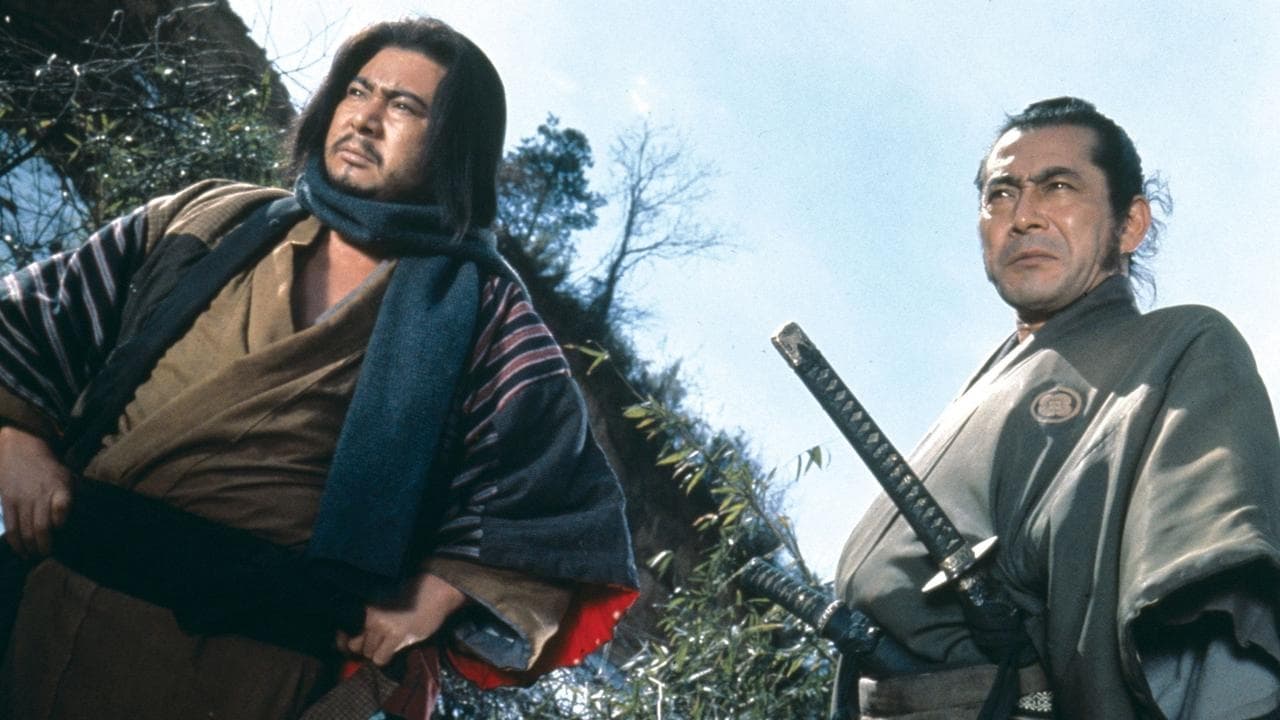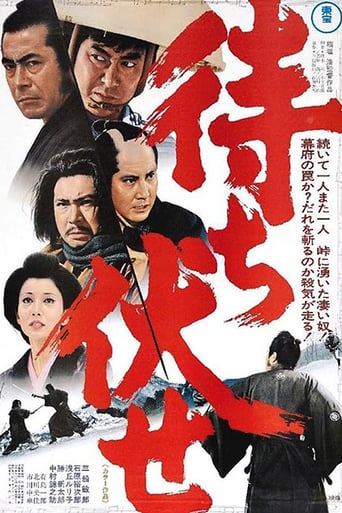

a film so unique, intoxicating and bizarre that it not only demands another viewing, but is also forgivable as a satirical comedy where the jokes eventually take the back seat.
... View MoreIf you like to be scared, if you like to laugh, and if you like to learn a thing or two at the movies, this absolutely cannot be missed.
... View MoreThis is a gorgeous movie made by a gorgeous spirit.
... View MoreExcellent and certainly provocative... If nothing else, the film is a real conversation starter.
... View MoreLike YOJIMBO and SANJURO, INCIDENT AT BLOOD PASS stars Toshiro Mifune as a ronin out to do good (though that's not really made clear until late in the going, which is okay). While the two aforementioned Kurosawa classics offer enough character and situational twists and turns to keep one guessing, INCIDENT AT BLOOD PASS is more linear and, therefore, much less engaging. It DOES boast a decent cast and some minor turns of its own, but it never quite achieves greatness. Of interest to fans of the genre is Shintaro Katsu as a villain. "Zatoichi," makes an excellent villain (he looks like a bearded Sammo Hung and, like Sammo, displays some surprising versatility). Not a bad entry, but not a world-beater, either.
... View MoreTreachery, betrayal, romance, and double crossings abound at a small inn at a remote pass in Inagaki Hiroshi's Incident at Blood Pass, a wonderfully constructed and suspenseful chambara classic.Toshiro Mifune reprises his role as a wandering ronin named Yojimbo, sent on a mission to a remote mountain pass named Sanshuu Pass. His instructions are simple he is, "to go to Sanshuu pass where (he) will wait until something happens." Once there, Mifune takes up a short residence at a local inn run by Oyuki and her grandfather. One of the residents at the inn is a doctor named Gentatsu (Katsu Shintaro, in a role that's a considerable departure from his Zatoichi character) who helps the innkeepers with their daily chores. Shortly after Yojimbo arrives, an officer barges in with a prisoner named Tatsu, this event throws into action a series of events which results in more plot twists and turns than a hot bowl of Soba noodles. Mifune and Katsu are excellent as always. Katsu's performance of Gentatsu is deliciously corrupt and ambiguously evil. Mifune is a little more reserved and serious than in Zatoichi Meets Yojimbo(Blood Pass and ZMY, are the only two films that feature both Katsu and Mifune) but is great and plays the role of a ronin like only he can. The ensemble cast is good as well from the grandfather down to Okuni (a woman Mifune saves from an abusive husband earlier on in the film). I particularly liked Kinnosuke Nakamura's power tripping dispatch officer Hiyomi who was as great as he was irritating.Blood Pass also features some beautiful cinematography and a rousing score. There are some beautifully filmed shots of snow capped mountains and foggy forests with a buoyant orchestral score. The film also features percussion music ala a young group of villagers who are in a drum band who frequent the inn. Although Incident at Blood Pass is a samurai film, it's not stuffed with chambara action. Most of the fun of Blood Pass comes from a hostage situation which occurs at the inn about an hour into the film. These segments are suspenseful and well directed, and are just as enjoyable as the free for all swordplay that fills the last ten minutes of the film. Incident is a great film but not without it's faults. The first 40 minutes are paced so slow that it borders on tedium. Katsu's Gentetsu disappears from the film for about a half an hour and is sorely missed. Lastly, the final scene of the film (Don't worry I won't give it away) seems as if it was thrown in at the last second.Bottom Line- Incident at Blood Pass has it's faults but it's strengths clearly outweigh its negatives. Highly recommended for fans of the genre but still a great film by any standards.
... View MoreMifune and Katsu made two movies together around 1970, this one and Zatoichi vs Yojimbo, an entry in the "blind swordsman" series. This one has significantly better direction (not surprising since Inagaki is one of the best) and production values and a more interesting ensemble of characters. For fans of the Zatoichi series, its fun seeing Katsu in such a different role. Mifune plays his usual laconic yojimbo character, however, a little more serious-minded than usual. The plot structure reminded me of Petrified Forest as a diverse group of characters assemble at the remote inn run by a miserly old man together with his romantically minded granddaughter. I like this film more each time I watch it due to the eccentric characters and their interactions. Although it's not an A list film on a par with many of Kurosawa, Kobayashi or even others by Inagaki (Samurai trilogy, Chushingura) its well done and fun. Definitely recommended for fans of Mifune and samurai movies.
... View MoreINCIDENT AT BLOOD PASS (aka MACHIBUSE, 1970) is a period suspense drama set at a remote inn located at a crucial mountain pass in Tokugawa-era Japan. It takes the time-honored premise of gathering a motley cast of characters and forcing them into close quarters together as trouble brews before a major confrontation. Toshiro Mifune stars as a wandering `yojimbo' (bodyguard) who has been hired to go to this pass and wait for something to happen. Quite a number of intriguing characters show up before Mifune gets a chance to figure out what his mission is.Shintaro Katsu (known for playing the title role of the blind swordsman in the Zatoichi series) plays an exiled doctor to whom there is more than meets the eye. A young wife whom Mifune rescued from an abusive husband gets a job at the inn and falls for Mifune. A young gambler arouses the passions of the innkeeper's pretty granddaughter. A zealous constable arrives holding a con man prisoner and proceeds to repulse everyone with his overbearing arrogance. When two of the con man's confederates come to try to free him, Mifune sides with the constable and fights and kills one while the other gets away to alert his gang. When the gang arrives that night, they hold everyone in the inn hostage and, not long afterwards, Mifune learns his true mission.A lot of tension is generated as the characters gather, romances develop, alliances form, and the audience is kept guessing as to who's really who and what's really what. Eventually we learn that the criminal gang is waiting to rob a caravan of the Shogun's gold scheduled to come through the pass the next day and the stage is set for a major action setpiece.The film is structured like a play, with most of the action taking place within the sprawling mountain inn where the characters all congregate. It recalls any number of Hollywood crime dramas and westerns where gangsters or outlaws hold a group of people hostage for an extended period while the hero waits for his chance to turn the tables on them. The characters here are all fascinating and well-etched and the conflicts that emerge develop naturally and believably from the volatile mix. In addition, they're all extremely well acted in a piece that's beautifully photographed and staged.Unfortunately, the payoff for all the waiting and suspense is surprisingly weak. Fans of Mifune and samurai films routinely expect a major sword duel between the hero and his antagonist to close the film, but it never happens here. A good reason is given for averting the confrontation with Mifune's opponent (who will go unidentified so as to avoid a spoiler), but it leaves the audience hanging. The final action, when it does occur, is run through rather quickly, relegated to the simple matter of rounding up and apprehending the criminals rather than releasing any tensions or providing cathartic bursts of violence. The first 5/6 of the movie is so good that it remains worth seeing, but don't expect an action-packed finale. The film is available on tape in the U.S. in a beautiful letter-boxed transfer with English subtitles.
... View More